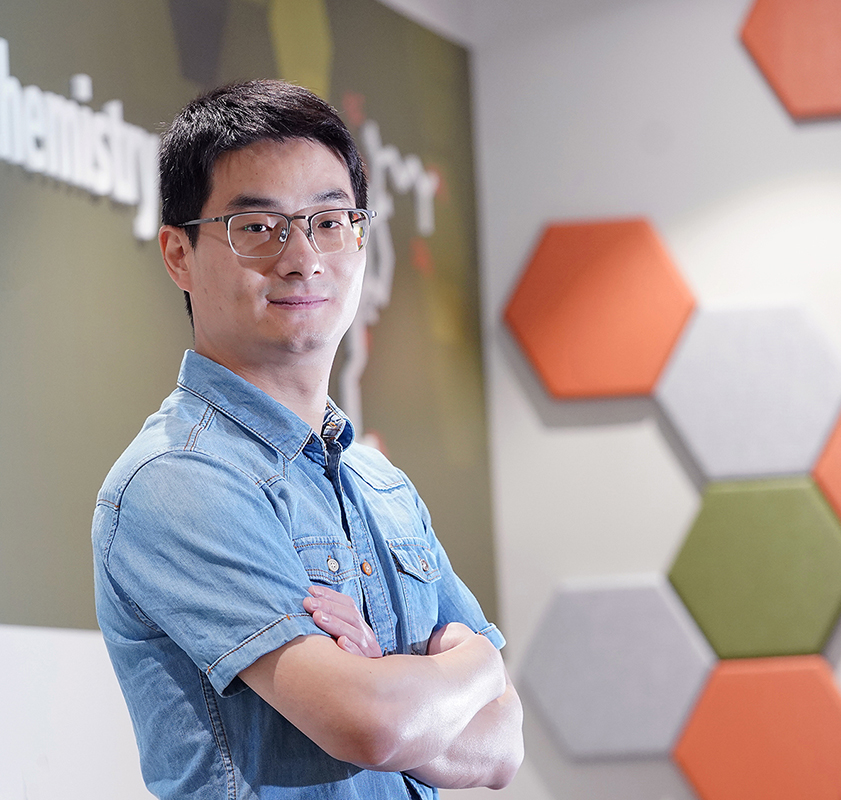Bingyu Yan
I think my grandmother would be proud of me. I’m doing research that may save the lives of people and in the future promote health.
- Bingyu Yan, PhD student, Biochemistry
The student
As an elementary school student in the Chinese city of Luoyang, Bingyu Yan often stayed with his grandmother. Her death from cancer would influence Yan’s academic choices and commitment to “devote myself to helping others,” he says: He would later add cancer research to his interest in plant physiology. After being introduced to biochemistry research as an undergraduate at Henan Agricultural University, he chose a major in biomedical studies. He then completed a master’s degree in molecular biology and biochemistry at Sun Yat-sen University in Guangzhou, China, where his research focused on genetic changes during cancer development as well as plant biology. His advisors encouraged Yan to hone his research skills in a U.S. doctoral program, but his first set of applications yielded no offers. Facing a gap year, he joined a Chinese company developing a clinical test for early cancer screening. “I thought that seeing this process from bench to bedside — how to translate research to a real product — would be better for my future career,” he explains. In a visit to a former roommate in Chicago. Yan toured parks and museums — and Purdue. The professors and students he met were friendly, and he recalls thinking, “If I got an offer, I would choose this university.” He was back at work in China when he was accepted to Purdue’s interdisciplinary life science program, PULSe, which offered research laboratories in both of his interest areas, cancer biology and plant biology. In July 2017 he returned to Purdue and after a year of rotation in different labs, began his work with Majid Kazemian, assistant professor in the departments of Biochemistry and Computer Science. “We are more collaborators than teacher-student,” Yan says of Kazemian’s advising approach. “He respects my ideas, and we have good communication and interaction.”
The research
“Currently my major projects explore the mechanism of host-pathogen interaction in human disease,” Yan says. He is the lead author on a paper published in Science Immunology that provided new insights into the human immune response to SARS-CoV-2 (COVID 19) infections. His current work focuses on virus-induced cancer and the role of non-coding RNAs in immune cells. This year Yan received his department’s AK Balls Award for research excellence and scientific achievement.
Opportunities
Yan also received the 2021 AAI Young Investigator Award from the American Association of Immunologists for his study of SARS-CoV-2 and presented at the 2022 AAI annual meeting. He has mentored six undergraduate computer science or biological engineering students and was a research mentor for the Summer Undergraduate Research Fellowship program. “Science is a team sport,” he says, citing the value of his mentees’ different backgrounds and disciplines. “We can integrate everyone’s expertise.”
Future plans
Yan expects to graduate in computational biology and immunology by June 2023 and will look for a position in a university or institute research lab. “I would like to be a PI with my own lab where I can help students and postdocs, he says. “I learned a lot from my mentors, and I’d like to guide others in the initial stages of their research careers.” Outside of the lab, Yan spends time hiking around West Lafayette and Ann Arbor with his wife, a postdoctorate fellow at the University of Michigan. He also enjoys reading, listening to music, and cooking both Chinese and American dishes.